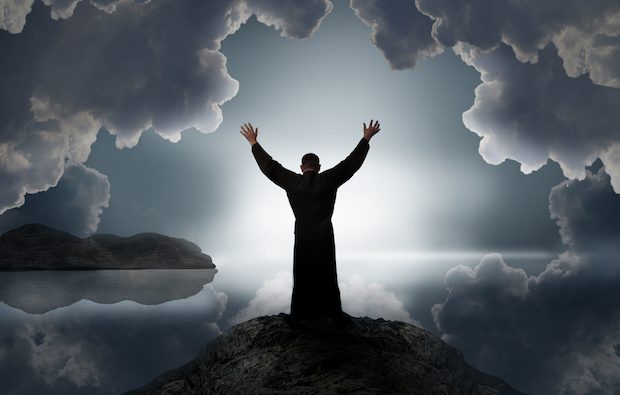‘God Is Dead, And We (Boomers) Have Killed Him’

A reader sends in this WSJ book review by D.G. Hart, of veteran religion journalist Kenneth Woodward’s latest book, Getting Religion, tracing the evolution of American religion in the postwar era. Excerpts:
In the 1950s, he writes, “Catholics inhabited a parallel culture that, by virtue of their numbers, ethnic diversity, wide geographical distribution, and complex of institutions mirrored the outside ‘public’ culture yet was manifestly different.” As Mr. Woodward sees it, Catholics were surrounded by a membrane that intermediated between the worlds of American society and the church. The “powerful sense of community” nurtured within this membrane has virtually disappeared. Now Americans “journey toward adulthood” not through relationships formed by families, neighbors, teachers, pastors and community organizations but through the effort of discovering “an inwardly derived, original, and authentic self,” one autonomous from “institutionally structured relationships.”
How this change happened is the subject of the book, and Mr. Woodward’s reporting put him on the front lines of the transformation.
More:
Throughout all these accounts the contrast between 1950s religious life and the subsequent decades abides. The baby boomers were looking for a religion that “had nothing to do with ancient texts, gender wars, or institutions”; they wanted instead “the experience of their selves as sacred.” Since most of Mr. Woodward’s subjects encountered faith as he did, in an institutionally rich environment, the author relies on recent sociological data to show where boomer religion has led. The rise of the “nones,” those young Americans without a religious identity, indicates that millennials “do not readily identify with any institutions—political, civic, academic, or religious.” When these young Americans do check a religion box, they inevitably affirm what the sociologist Christian Smith has called “moralistic, therapeutic deism.” This is an ethic that says “what is right for me may not be right for you but no one has the right to judge anyone else.”
I’d like to read that Woodward book. The title of this blog post refers to the well-known line from Nietzsche, put into the mouth of a madman. Well, maybe not as well-known as it ought to be. Most people have heard the phrase “God is dead” attributed to Nietzsche, who certainly believed it. The complete line — “…and we have killed him” — is necessary to understand what Nietzsche was getting at. It certainly sounds like it could apply to the Baby Boomers.
I don’t say this as another shopworn anti-Boomer rant. We’ve all heard it before. What this passage from Hart’s review brings to mind are the posts the Anglican theologian Ephraim Radner published about the “Anthropocene” age. From the first one:
In light of such a “bigger picture,” I believe that the recent debate in our churches over same-sex marriage has been a distraction from a more fundamental challenge Christians must face. Not that same-sex marriage is unimportant, or should not be opposed. But it is hardly an anti-evangelical Rubicon. At worst, same-sex marriage is a late-stage sign of a far deeper, wider, and long-rooted set of cultural and social changes that have completely reoriented human existence away from its prior and universal understanding of purpose. These changes have engulfed almost all Christians in the world, largely because they are global changes, systemic in every respect, complex, and voracious.
Aspects of these changes have, in themselves, little moral character. Others are intrinsically repugnant. Taken together, however, they constitute an attempt at reinventing what it means to be human. They thereby profoundly obscure our true human character as creatures of God; indeed, they have obscured from our eyes God himself. Since Christians are also bound up in these vast socio-cultural changes, our calling to clarify the truth in their face has been made very difficult indeed: in speaking the truth, we are criticizing ourselves. We are all caught up in the dynamics of the anti-human in major and profound ways, whatever stand we take on individual issues. There is no safe place in the world or in our churches within which to be a Christian. It is a new epoch.
Yes. As I’ve been saying for some time now, same-sex marriage is not a cause of anything, but the clearest indicator of a profound change that has already occurred. More:
The generational divide on these matters is not a surprise: younger Christians mostly accept same-sex marriage. After all, the young are fully formed in the culture their parents have raised them in. And it remains the case that most traditional Christians simply live and accept the alternative views of their offspring. Hypocrisy is not the issue here – although it is sometimes that. Traditional Christians are mostly living with a false sense of purpose, as if saying “no” to the Anthropocene in this one place — sex — will turn the tide. It won’t.
There is no safe place. “The whole world groaned and marvelled to find itself Arian,” St. Jerome once wrote about the strange ways that the Church in the 4th century almost wholly lost its way on a fundamental truth about Jesus. We are now, arguably, in a worse place: we have woken up — or have we? — to find the whole world (read Church) become idolators.
This is a very, very important point about the Benedict Option. If you’re one of those people who think I’m promoting some sort of escapist utopia, hear me clearly: Radner is right — there is no safe place. What I propose with the Benedict Option is a set of practices that will strengthen Christians and their communities for this trial now upon us. That’s the best we can hope for: the strength of endurance.
Radner’s other two posts in this series are here and here. I do not agree with all his conclusions, but I strongly recommend reading them.
Subscribe for as little as $5/mo to start commenting on Rod’s blog.